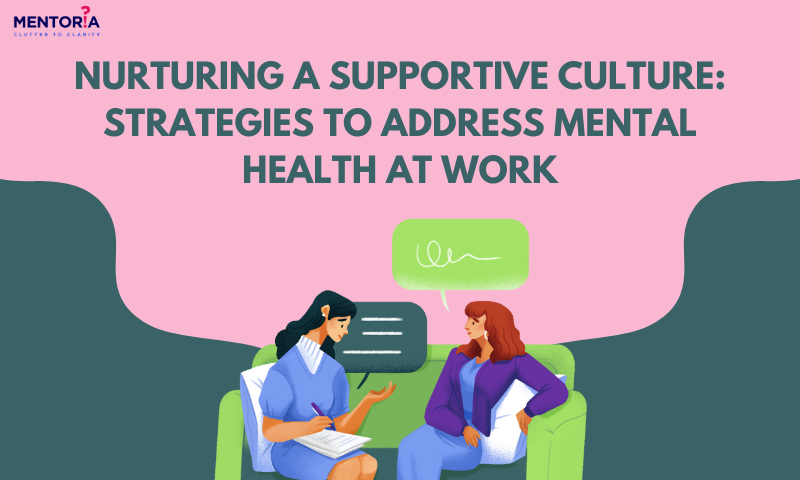Nurturing A Supportive Culture: Strategies To Address Mental Health At Work

In today’s fast-paced and demanding work environment, prioritising mental health has become more crucial than ever. Promoting a positive and supportive workplace culture not only enhances productivity but also fosters the well-being of colleagues. By addressing mental health concerns and providing necessary support, organisations can create an environment where individuals thrive. So, let’s explore a few effective ways to address mental health among colleagues and build a happier and healthier workplace together.
Ways To Address Mental Health
Encouraging Open Communication: Breaking The Silence
Encouraging open and honest communication about mental well-being is vital. Create an environment where colleagues feel safe sharing their concerns without fear of judgement or stigma. Managers and supervisors should be trained to listen actively and respond with empathy. Regular check-ins can provide opportunities for individuals to express their feelings and discuss any challenges they may be facing. Consider implementing anonymous feedback channels or suggestion boxes to ensure confidentiality and encourage honest sharing. Here are some tips on how to create an environment where colleagues feel safe sharing their concerns without fear of judgement or stigma:
- Model open communication and vulnerability. If you want your colleagues to feel comfortable sharing their thoughts and feelings, you need to be open and vulnerable yourself. Share your own experiences and challenges, and let your colleagues know that you’re there to listen and support them.
- Create a culture of trust and respect. People are more likely to feel safe sharing their concerns in an environment where they feel trusted and respected. Make sure your colleagues know that you value their input and that you’re committed to creating a positive and supportive work environment.
- Encourage open dialogue and feedback. Create opportunities for your colleagues to share their ideas and feedback, both positive and negative. Let them know that you’re open to hearing their thoughts, even if they’re different from your own.
- Be mindful of your language and tone. The way you speak to your colleagues can have a big impact on their willingness to share their concerns. Avoid using language that is judgmental or critical, and make sure your tone is warm and supportive.
- Be proactive in addressing concerns. If you hear about a concern, don’t ignore it. Take the time to talk to the person who raised the concern and see how you can address it.
- Provide resources and support. If someone shares a concern with you, let them know that you’re there to support them. Provide them with resources, such as counselling or employee assistance programs, if they need them.
Establishing Employee Assistance Programs (Eaps): Professional Support At Hand
Employee Assistance Programs (EAPs) are invaluable resources for addressing mental health concerns. These programs offer confidential counselling services, resources, and referrals to employees in need. Collaborate with mental health professionals or counselling services to provide support for colleagues experiencing stress, anxiety, or other mental health issues. Communicate the availability of EAP services through various channels. Here are some strategies for promoting EAP services through various communication channels:
- Company Newsletters: Include regular updates or dedicated sections in company newsletters to highlight the EAP services. Provide information about the benefits of using the program, success stories from employees who have utilised it, and any upcoming events or resources available through the EAP. Make sure the newsletter reaches all employees and is easily accessible.
- Intranet Platforms: Create a dedicated section on the company’s intranet platform where employees can find comprehensive information about the EAP services. Include details about how to access the program, contact information for EAP providers, available resources, and frequently asked questions. Ensure that the section is easily navigable and regularly updated with relevant content.
- Orientation Programs: Incorporate information about the EAP services into employee orientation programs. Dedicate a portion of the orientation session to explain the purpose and benefits of the program. Provide employees with informational materials, brochures, or handouts that they can refer to later. Encourage new hires to take advantage of the EAP services and emphasise the confidentiality and support available to them.
- Email Campaigns: Send targeted emails to employees, highlighting the availability of EAP services and encouraging their utilisation. Include success stories or testimonials from employees who have benefited from the program. Highlight specific services offered, such as counselling, financial assistance, or work-life balance support. Provide clear instructions on how to access the services and whom to contact for assistance.
Organizing Mental Health Workshops And Training: Knowledge Is Empowerment
Education plays a vital role in destigmatizing mental health issues and equipping colleagues with the knowledge to recognize and respond to signs of distress. Organise interactive workshops and training sessions focused on mental health awareness, stress management techniques, resilience-building, and promoting work-life balance. Invite mental health experts, therapists, or counsellors to facilitate discussions and provide practical tools for colleagues to implement in their daily lives. Consider including the following types of workshops:
- Mental Health 101: This workshop provides an overview of common mental health issues, such as anxiety, depression, and stress-related disorders. It aims to increase awareness and understanding of mental health, reduce stigma, and promote a supportive work environment.
- Stress Management Techniques: In this workshop, participants learn practical strategies for managing stress and building resilience. It may include relaxation techniques, mindfulness exercises, time management tips, and coping mechanisms to help individuals navigate work-related stressors.
- Emotional Intelligence and Communication Skills: This workshop focuses on enhancing emotional intelligence and improving communication skills. Participants learn how to identify and manage their own emotions, as well as effectively communicate and empathise with others. These skills contribute to healthier relationships and better workplace dynamics.
- Work-Life Balance and Self-Care: This workshop addresses the importance of maintaining a healthy work-life balance and practising self-care. It explores strategies for setting boundaries, managing priorities, and incorporating self-care activities into daily routines. Participants learn how to prioritise their well-being and create a harmonious balance between work and personal life.
- Resilience Building: This workshop aims to enhance individuals’ resilience and ability to bounce back from challenges and setbacks. It covers topics such as building optimism, cultivating a growth mindset, developing problem-solving skills, and fostering adaptability in the face of change.
Implementing Flexible Work Arrangements: Balancing Well-Being And Productivity
Flexible work arrangements can significantly impact mental health positively. Offer options for remote work, flexible hours, or compressed workweeks to accommodate personal commitments and reduce work-related stress. Establish clear guidelines and expectations for remote work, ensuring that colleagues have the necessary resources and support to succeed in their roles. Flexible arrangements promote a healthier work-life balance, increase job satisfaction, and enhance overall well-being. Here are some guidelines and expectations that employers can consider:
- Employees should be able to access all of the same resources and information as they would if they were working in the office. This includes company files, training materials, and software.
- Employees should be able to communicate with their team members and managers effectively. This includes using video conferencing, instant messaging, and email.
- Employees should be able to meet deadlines and complete their work assignments. They should also be able to work independently and as part of a team.
- Employees should be able to maintain a healthy work-life balance. They should be able to take breaks and vacation time, and they should not be expected to work excessive hours.
Promoting Physical Well-Being: A Healthy Body, A Healthy Mind
Physical and mental health are interconnected. Encourage colleagues to prioritise their physical well-being by promoting regular exercise, healthy eating habits, and mindfulness practices. Provide access to wellness programs, fitness resources, and ergonomic workspaces. Organise wellness challenges or initiatives, such as step competitions or mindfulness workshops, to engage colleagues and reinforce the importance of self-care. For instance, Google is known for its comprehensive wellness programs. The company offers on-site fitness centres, yoga classes, mindfulness workshops, and healthy food options in their cafeterias. They also provide access to fitness trackers and organise wellness challenges to encourage regular exercise and healthy habits. Johnson & Johnson also has a long-standing commitment to employee well-being. Their wellness programs include on-site fitness centres, weight management programs, smoking cessation support, and mental health resources. The company also offers incentives for participation in wellness activities and provides access to virtual wellness resources.
Developing Peer Support Programs: Strengthening Connections
Peer support programs create a network of colleagues who can provide emotional support and understanding. Encourage the formation of support groups or buddy systems where individuals can connect, share experiences, and offer support to one another. These programs foster a sense of belonging, reduce feelings of isolation, and create a supportive workplace community. Consider assigning mentors or experienced colleagues to provide guidance and support for new hires or those transitioning to new roles.
Creating Mental Health Policies And Resources: Clear Guidelines For Support
Develop comprehensive mental health policies that outline the organisation’s commitment to employee well-being. Communicate the resources available for mental health support, including EAPs, counselling services, and mental health hotlines. Educate employees about their rights, entitlements, and how to seek help when needed. Train managers and supervisors on recognizing and responding to mental health concerns, emphasising the importance of confidentiality and empathy.
Encouraging Self-Care And Work-Life Balance: Prioritising Well-Being
Emphasise the importance of self-care and work-life balance as integral parts of a healthy work environment. Encourage colleagues to take regular breaks, use vacation days, and engage in activities they enjoy outside of work. Lead by example, demonstrating that well-being is a priority for everyone in the organisation. Foster a culture that values self-care and acknowledges the importance of maintaining a balance between work and personal life.
Promoting Mindfulness And Meditation Practices: Finding Inner Peace
Introduce mindfulness and meditation practices to support colleagues in managing stress and enhancing mental well-being. Offer guided meditation sessions or provide resources such as meditation apps or mindfulness workshops. Encourage colleagues to take short breaks during the day for deep breathing exercises or mindful moments to recenter and refocus their energy.
Establishing Mental Health Champions: Advocates For Well-Being
Identify and train mental health champions within the organisation who can serve as advocates for mental health and well-being. These individuals can raise awareness, provide peer support, and act as liaisons between colleagues and management. Mental health champions can organise events, share resources, and promote mental health initiatives within their teams.
Creating A Safe Haven With Mentoria
Addressing mental health in the workplace is not only essential but also beneficial for individuals and organisations alike. By implementing these 10 strategies, organisations can create a supportive and inclusive environment where colleagues feel comfortable discussing mental health, seeking support, and taking steps to maintain their well-being. Remember, small changes can make a significant impact. Together, let’s prioritise mental health, support one another, and build a happier and healthier workplace.
At Mentoria, we understand the importance of mental health in the workplace. Our expert career counsellors can provide guidance and support, helping individuals navigate challenges, manage stress, and prioritise self-care. Together, we can create a healthier and happier work environment.









